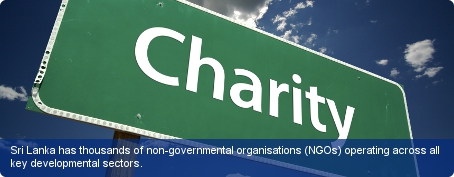Find Civil Society expertise in Sri Lanka

Sri Lanka has thousands of non-governmental organisations (NGOs) operating across all key developmental sectors. Sarvodaya is Sri Lanka’s largest NGO. Its main areas of operation are in the rural areas covering 15,000 villages, 345 divisional units, 34 district offices and 10 specialist Development Education Institutes. Sarvodaya is founded on Buddhist and Gandhian principles.
Soon after the Asian Tsunami of 2004, several hundred NGOs were seen pouring into the country. The World Bank estimated that the NGO sector contributed US$750 million of relief in the immediate aftermath of the Tsunami. Ever since many private sector bodies, government and inter-governmental organisations have channelled most of their funding via NGOs as this has been seen as one of the most effective ways to get aid and relief to the most needy.
Many of Sri Lanka’s other international NGOs work with various projects such as communities affected by the recurrent conflict between the Tamil Tiger separatists and government forces and supports microfinance projects, gender equality and infrastructure development. Oxfam has played a prominent role in the past, tackling poverty created by the civil war.
The registration, operations and activities of NGOs and CSOs are monitored by the National Secretariat for NGOs and the Ministry of Defence. NGOs wanting to operate in the country must register with the Secretariat and the Ministry of Defence. Because of the security situation in the country the Ministry of Defence has to give its express consent on the formation of all NGOs.
Sri Lanka is home to almost 2,000 trade unions, many having political affiliations. Whilst there is no official national trade union centre, many trade unions are associated with national federations and councils, including the Public Services National Trade Union Federation. Trade unions must register with the Registrar of Trade Unions in compliance with the Trade Union Ordinance.



